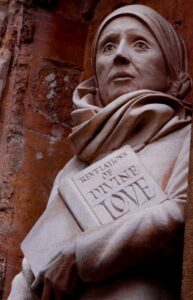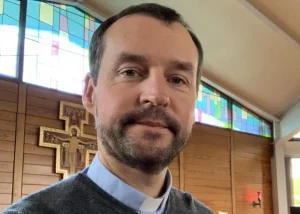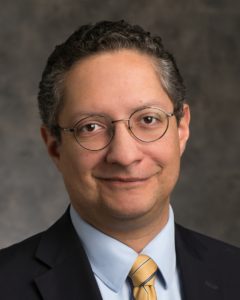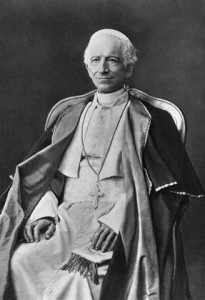Podcast: Play in new window | Download (Duration: 39:27 — 27.2MB) | Embed
Subscribe: Apple Podcasts | Spotify | Amazon Music | Android | Pandora | iHeartRadio | JioSaavn | Podchaser | Gaana | Podcast Index | Email | TuneIn | Deezer | Anghami | RSS | More

All Shall Be Well: A Journey Through Julian of Norwich’s Revelations of Divine Love with Kris McGregor
Episode 4: The Fourth and Fifth Shewings — Blood, Mercy, and the Triumph of Christ
Summary:
In this episode we enter the Fourth and Fifth Shewings, where Julian beholds the Precious Blood of Christ poured out in love, not horror, and is wrapped in His “homely loving”—an intimate mercy that does not recoil from sin but encloses it. She sees how Christ’s Passion overcomes the enemy, not by force but through unfathomable love, turning even the devil’s malice into the joy of the saved. With vivid tenderness and deep theological insight, Julian invites us to find refuge in the Blood of Christ, rejoice in His victory, and rest in the truth that all shall be well.
For other episodes in this series visit: All Shall Be Well: A Journey Through Julian of Norwich’s Revelations of Divine Love with Kris McGregor
Full Julian of Norwich Quotations Used in Episode 4:
From Revelations of Divine Love, Long Text, Chapters XII-XIII, trans. Grace Warrack, Methuen & Co., 1901 (PDF edition).
The Fourth Shewing – Christ’s Homely Loving and the Meaning of Sin
“For in that same time that I saw this bodily sight, our Lord shewed me a spiritual sight of His homely loving. I saw that He is to us everything that is good and comfortable to our help. He is our clothing that for love wrappeth us, claspeth us, and all encloseth us, for tender love.” (Ch. XII)
The Precious and Plenteous Blood of Christ
“And after this I saw, beholding, the body plenteously bleeding in seeming of the Scourging, as thus:—The fair skin was broken full deep into the tender flesh with sharp smiting all about the sweet body. So plenteously the hot blood ran out that there was neither seen skin nor wound, but as it were all blood…” (Ch. XII)
“The dearworthy blood of our Lord Jesus Christ as verily as it is most precious, so verily it is most plenteous. Behold and see! The precious plenty of His dearworthy blood descended down into Hell and burst her bands and delivered all that were there which belonged to the Court of Heaven. The precious plenty of His dearworthy blood overfloweth all Earth, and is ready to wash all creatures of sin, which be of goodwill, have been, and shall be. The precious plenty of His dearworthy blood ascended up into Heaven to the blessed body of our Lord Jesus Christ, and there is in Him, bleeding and praying for us to the Father,—and is, and shall be as long as it needeth;—and ever shall be as long as it needeth. And evermore it floweth in all Heavens enjoying the salvation of all mankind.” (Ch. XII)
The Fifth Shewing – The Passion Overcomes the Fiend
“After this, ere God shewed any words, He suffered me for a convenient time to give heed unto Him and all that I had seen, and all intellect that was therein, as the simplicity of the soul might take it. Then He, without voice and opening of lips, formed in my soul these words: ‘Herewith is the Fiend overcome.’ These words said our Lord, meaning His blessed Passion as He shewed it afore.” (Ch. XIII)
“On this shewed our Lord that the Passion of Him is the overcoming of the Fiend. God shewed that the Fiend hath now the same malice that he had afore the Incarnation. And as sore he travaileth, and as continually he seeth that all souls of salvation escape him, worshipfully, by the virtue of Christ’s precious Passion. And that is his sorrow, and full evil is he ashamed: for all that God suffereth him to do turneth [for] us to joy and [for] him to shame and woe. And he hath as much sorrow when God giveth him leave to work, as when he worketh not: and that is for that he may never do as ill as he would: for his might is all taken into God’s hand.” (Ch. XIII)
But in God there may be no wrath, as to my sight: for our good Lord endlessly hath regard to His own worship and to the profit of all that shall be saved. With might and right He withstandeth the Reproved… Also I saw our Lord scorn his malice and set at nought his unmight; and He willeth that we do so. For this sight I laughed mightily, and that made them to laugh that were about me… I thought that I would that all mine even-Christians had seen as I saw, and then would they all laugh with me.” (Ch. XIII)
“But I saw not Christ laugh. For I understood that we may laugh in comforting of ourselves and joying in God for that the devil is overcome. And when I saw Him scorn his malice, it was by leading of mine understanding into our Lord: that is to say, it was an inward shewing of verity, without changing of look.”(Ch. XIII)
“I see three things: I see game, in that the Fiend is overcome; I see scorn, in that God scorneth him, and he shall be scorned; and I see earnest, in that he is overcome by the blissful Passion and Death of our Lord Jesus Christ that was done in full earnest and with sober travail.” (Ch. XIII)
When I said, he is scorned,—I meant that God scorneth him, that is to say, because He seeth him now as he shall do without end. For in this [word] God shewed that the Fiend is condemned. And this meant I when I said: he shall be scorned: [he shall be scorned] at Doomsday, generally of all that shall be saved, to whose consolation he hath great ill-will.44 For then he shall see that all the woe and tribulation that he hath done to them shall be turned to increase of their joy, without end; and all the pain and tribulation that he would have brought them to shall endlessly go with him to hell.(Chap XIII)
Scripture Featured
(Translations used: Revised Standard Version [RSV] )
- (Rom 13:14, RSV)
“Put on the Lord Jesus Christ”
- (Psalms 91:4, RSV)
“He will cover you with His pinions, and under His wings you will find refuge”
- (1 Tim 2:4, RSV)
- (Rom 5:20, RSV)
- (Rom 8:28, RSV)
“We know that in everything God works for good with those who love Him.”
- (Rom 2:4, RSV)
Catechism of the Catholic Church
“By his Passion and death on the Cross, Christ has given a new meaning to suffering: it can henceforth configure us to him and unite us with his redemptive Passion” (CCC 1505).
“The Eucharist is thus a sacrifice because it re-presents (makes present) the sacrifice of the cross and applies its fruit.” (CCC 1366).“God predestines no one to go to hell; for this, a willful turning away from God (a mortal sin) is necessary, and persistence in it until the end” (CCC 1037).
“The desire for God is written in the human heart… and God never ceases to draw man to Himself” (CCC 27).
“Nothing occurs that God cannot turn toward the good.”
(CCC 312)“By his death he has conquered death, and so opened the possibility of salvation to all men.”(CCC 634)
“The Last Judgment will reveal…the ultimate meaning of the whole work of creation and of the entire economy of salvation and understand the marvelous ways by which His Providence led everything towards its final end.” (CCC 1040)
Reflection Questions for Prayer
- How do you experience Christ’s “homely loving” in the midst of your own struggles?
- What does it mean for you to trust that the Precious Blood of Christ still flows for you?
- Can you find joy in the truth that evil has already been overcome by the Passion of Christ?
Closing Prayer (inspired by the Fourth and Fifth Shewings)
Lord Jesus Christ,
You bled for love and suffered for our salvation.
You have overcome the darkness and crushed the enemy beneath Your feet.
Wrap us now in Your homely loving—
Draw near to our wounds with Your Precious Blood.
Fill our hearts with joy in Your triumph.
And help us never forget that in Your Passion, all things are made new.
Amen.
© Discerning Hearts. All rights reserved.






 About Pope Leo XIII
About Pope Leo XIII